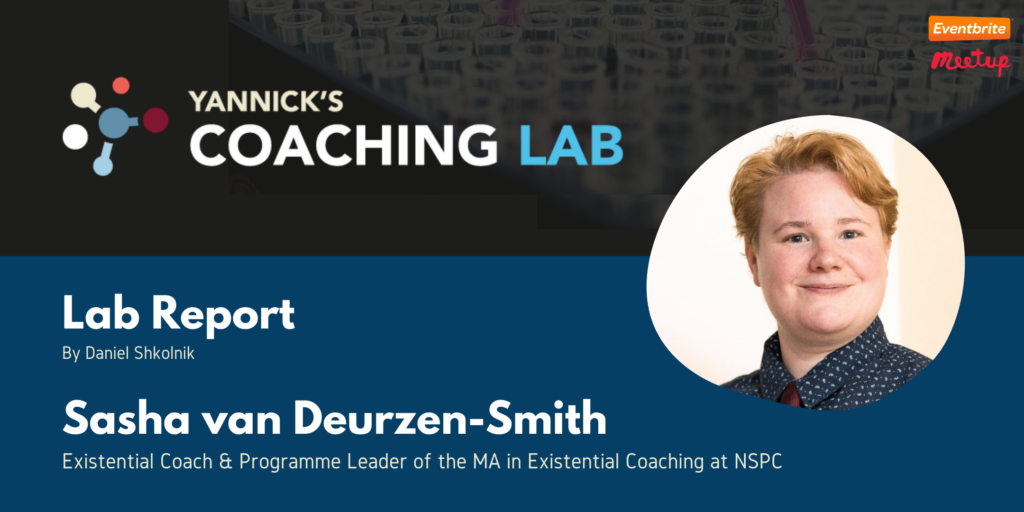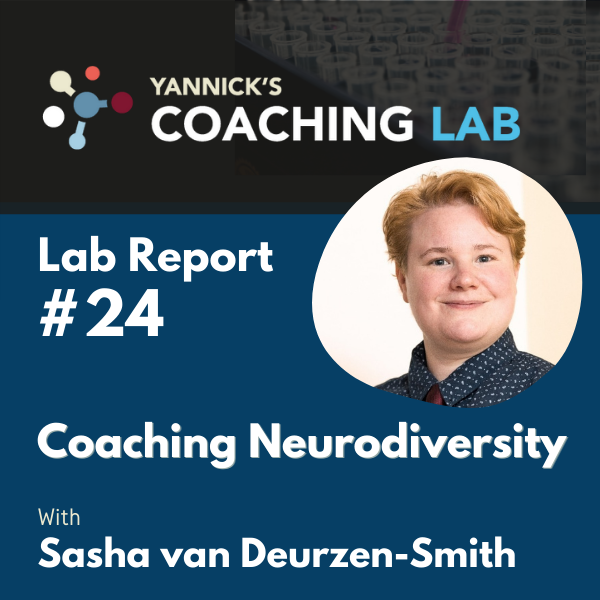
Sasha and I go way back to the earliest days of my coach training. In 2010 we started our existential coaching journey together and a few years later we were the first people in the world to graduate with an MA in Existential Coaching. A few years later they took over the very programme and has done some amazing work in our field as well as others. I’ve had them on the podcast if you’d like to go on a deep dive with us into a variety of topics, and I finally got to see them with a client for the first time in 11 years.
Curious to know more? Have a peek at this month’s Lab Report below or consider membership to access the recording of more exciting coaching sessions (including a 45min debrief and Q&A with coach and client).
Yannick’s Coaching Lab #24 — Sasha van Deurzen-Smith
Lab Report by Daniel Lev Shkolnik
Summary
Sasha is an existential coach, specialising in neurodiversity, LGBTQ+ issues, self esteem and creativity. They are the director of the MA in Existential Coaching at the New School of Psychotherapy and Counselling in London. Their client is a coach and a mother. Her son was recently diagnosed with Autism Spectrum Disorder (ASD). In this session she confronted the emotional ramifications of this diagnosis and explored the implications that she herself has lived with undiagnosed ASD all her life.
Key Insights
Self-Disclosure and assumptions
Sasha also has ASD, but they cautioned that just because there are aspects of a client’s experience we have in common, it doesn’t mean we experience it in the same way. “It’s easy to miss something in another person’s experience because we’re not as curious,” says Sasha. We assume we already know what another person’s experience is and they may not feel fully heard.
Coaching the big question: “Who am I?”
Sasha’s client learned how to adapt and present herself in social interactions in accordance with what’s perceived as “normal.” She said the well-liked and well-adjusted persona others see is a mask she puts on before leaving the house each day. The client felt a deep existential concern about who the “me” was beneath her mask of normalcy.
Holding ambiguity
Sasha could hear the complexity of the existential feelings around identity and who their client is behind the mask of normalcy. Sasha avoided the temptation to simplify it. Instead, she simply held the multiple aspects and layers of complexity without attempting to solve or resolve.
Layers upon layers of masking. If and where to start such a process?
Sasha did not press the client to start the unmasking process and reveal her ASD to her social circles. There are reasons why people built up the mask, says Sasha, and there are reasons why they are hesitant to take it off. The masks are a part of us. Discarding the mask entirely, Sasha implies, may discard an important part of us, and coaching this process can be risky.
Takeaway
In coaching neurodiverse clients, both Sasha and their client said they rely on their own experience with ASD to help empathize with and appropriately guide their clients. Certain challenges that came up, like masking, is something many people do, but the dilemma is heightened for neurodiverse clients who struggle to present as “normal.” And when Big Questions come up in a session, sometimes they have no simple answer. The best thing to do may simply be to hold the complexity and ambiguity without simplification or resolution.
Watch the recording of this session and debrief by becoming a member: https://bit.ly/CoachingLabMembership
The complete vault of recordings can be found at https://bit.ly/LabRecordings
Many more exciting Labs are on the horizon: https://bit.ly/FutureCoachingLabs

